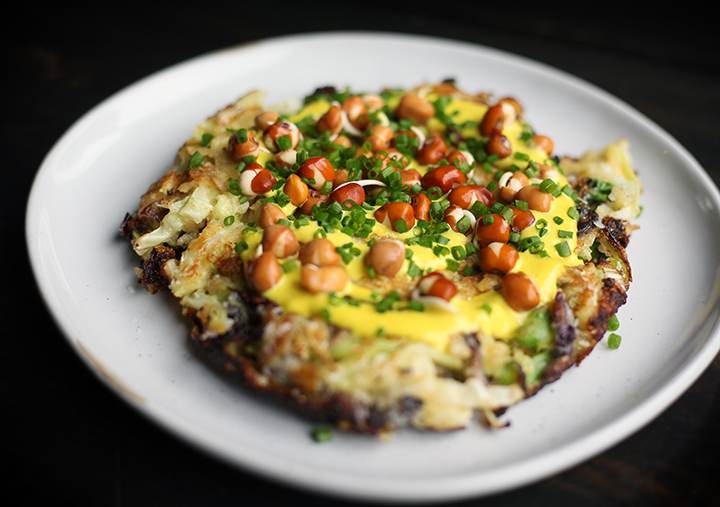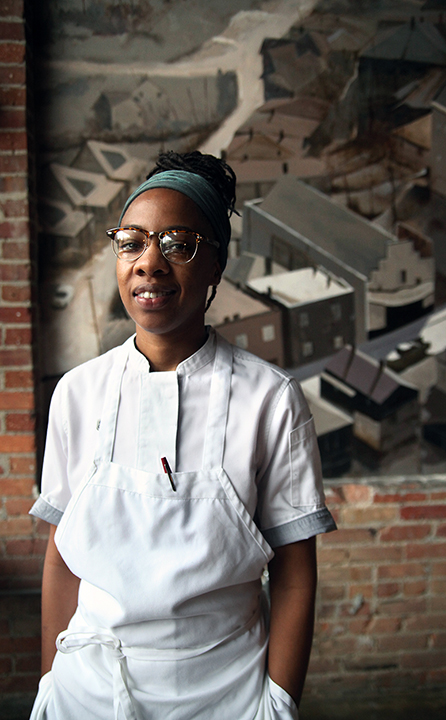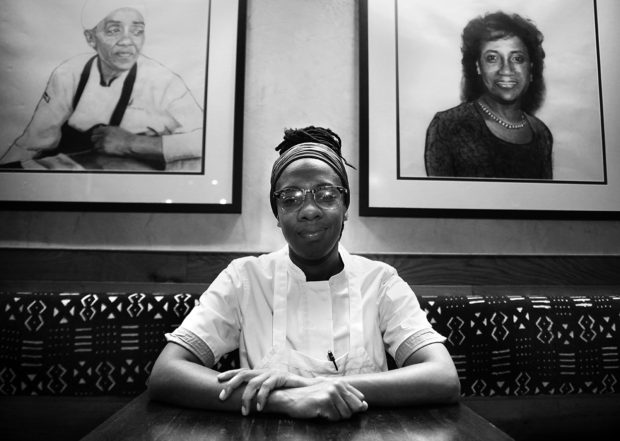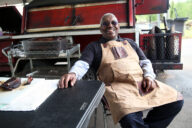Article by Debra Freeman with photography by Fitz
Lead photo: Chef Ashleigh Shanti seated in Benne on Eagle
Five pieces of art hang on the walls in Benne on Eagle, a restaurant inside the Foundry Hotel in Asheville, North Carolina. Four are large black and white photographs of African-American women who owned restaurants nearby hung over a banquette. The other is a map of the historically black neighborhood, where rooms inside the hotel can be booked for almost $400 a night in the summer season.
Benne on Eagle is dotted with African fabrics and baskets, and the dark wood and tables are warmed by the sunlight streaming in through the large picture windows that face the street. The kitchen is on the other side of a long counter, ensuring that diners see an intimate perspective of their meals before their plates arrive at the table.
Asheville is a part of Appalachian country, and the food of the region is the very definition of farm to table, but before it was trendy. Delve a little deeper into Appalachian food, and you’ll find there is a rich legacy of African-Americans that have lived in the region for hundreds of years and have had an influence on Appalachian food as we know it. So if you’re expecting a typical neo-Southern experience, you’d be mistaken, as it was important to Chef Ashleigh Shanti to make people aware that all African-American food isn’t the same.
Shanti has journeyed all around the world to learn how she wanted to express herself through her food. A native of Virginia Beach, Shanti attended Hampton University before going to culinary school in Baltimore, and spent a year and a half working as a culinary assistant to North Carolina Chef Vivian Howard. The young chef has settled on an intersection between her world travels and desire to include her culinary lineage.

Cabbage Pancake (Savoy cabbage, radicchio, shiitakes, chow-chow Mayo, sprouted peas)
The influence of working with Southern chefs can been seen through dishes included on the menu-it’s undeniable that potlikker braised chicken wings and fried catfish and waffles have firm origins in the southern food canon, but other menu selections tell an even more complex story.
Take the dish she served me, for example. Served lightly glistening with oil, the cabbage pancake has fairly straightforward ingredients-savoy cabbage, radicchio, shiitakes, chow-chow mayo, and sprouted peas. However, Shanti considers this to be the ultimate combination of all of her experiences. The pancake is based on okonomiyaki, which Shanti discovered during her travels to Japan, while the ingredients are a nod to her maternal grandmother’s Appalachian heritage.
Before taking on her current role, she took a six-month road trip, and while camping at Shenandoah National Park, she “felt some sense of connectivity to that area and being able to forage…that was reminiscent of things my grandmother would do. Even exploring the history and learning about the area and learning about the erasure of African-American culture. I was just kind of on a journey to explore that a little more…I do think it gave me the ability to relate a lot of it to what we do here at the Benne on Eagle. I had no idea I would be the chef of a restaurant in Appalachia, so it all worked out really well.”

Chef Ashleigh Shanti
The first published cookbook by an African-American, A Domestic Cookbook, was written by Malinda Russell, a free black woman from the Appalachian region in 1866. “To my knowledge, the first Appalachian cookbook is written by a free black woman who is a business entrepreneur…that just flies in the face of everyGranny Clampett, Mammy Yokum stereotype you’ve ever heard,” according to Ronni Lundy, author of Victuals, a book which explores Appalachian food.
However, the commitment to her heritage is also challenging, as Shanti is aware of the fine line between creating something new while still honoring the food of Appalachia. She explains, “It’s difficult knowing there’s expectations with what I’m trying to do. It’s what we as chefs do already, melding experiences into one dish. But it’s difficult because of the preconceived notions that people already have [about African American food].”
Looking forward, Shanti wants to continue to discover who she is, and wants her cooking to reflect that journey. Being aware of her heritage and making sure that is included in her food is important to her, and wants to ensure Appalachia is on the plate. “It’s part of me and is who I am, so I can’t imagine cooking food that doesn’t inherently have those influences, she says. “It has to be personal…it has to be for people to believe it.”







No Comments